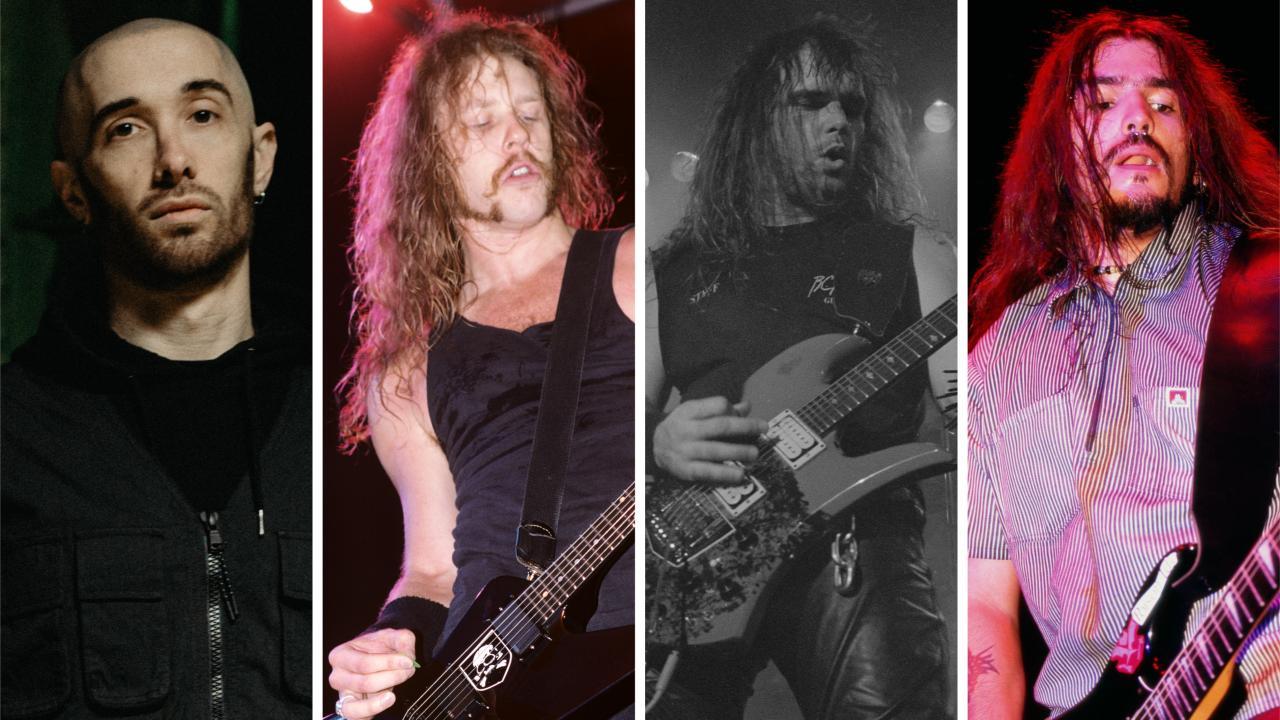Metal is a genre that prides itself on its technicality – but sometimes a meaty guitar riff is all you need to serve a great song. Getting faces scrunched and heads banging is one of the best things a heavy band can do, and it’s a fine art that takes years to master. Sometimes, writing a caveman riff is trickier than it seems.
One person that should know all about that is Sylosis frontman and guitarist Josh Middleton. “I’m not good at many things… but I think I am pretty good on the guitar,” he tells Metal Hammer as he sits down with us on a Zoom call. In advance of his band releasing their new album A Sign Of Things To Come in September, we asked the British metal virtuoso to name 10 songs that used immense complexity to make a riff that sounds so simple.

Metallica – Blackened (…And Justice For All, 1988)
“As [Metallica singer/guitarist] James Hetfield would tell you, the Blackened riff is all downpicking. If that’s not bad enough, you’ve got a really fast little gallop in there as well that can trip you up. It’s hard. It does actually sound hard, but it’s even harder than it sounds. Add in the fact that James plays his guitar so low down and that makes it a million times harder.”
Slipknot – Surfacing (Slipknot, 1999)
“The middle-eight section. It sounds quite notey, but they play it all downpicking. That was one of the things Mick [Thomson, Slipknot guitarist] said to Jim [Root, co-guitarist] when he joined the band: it needed to be downpicked. The stamina you need to play that is tough. Admittedly it isn’t a simple riff, but it’s made twice as hard thanks to the approach, which takes a lot of hand strength.”
Tool – Invincible (Fear Inoculum, 2019)
“There’s a riff that Tool’s Invincible builds up to, and it’s the counting: I don’t like to have to do maths, I don’t want to do the counting. I don’t want to use my brain too much. I have no idea what the time signature is, but anything that requires a bit of counting while you’re playing is like patting your head and rubbing your stomach.”
Slayer – Raining Blood (Reign In Blood, 1986)
“If you listen to the Slayer Raining Blood riff then you’ll go, ‘Oh, yeah, that’s really hard.’ But, as a kid hearing it, I didn’t think it was hard, because I couldn’t hear the notes. All I could hear was a blur, because it’s an old-school recording: the depth and clarity isn’t there like it is with some modern recordings, so all those notes skipped me. It was only years later when I saw them playing it that I was like, ‘Oh, you’ve got all these notes in there!’”
Machine Head – Davidian (Burn My Eyes, 1994)
“I saw a video recently with this YouTuber, Ola Englund, who interviewed [Machine Head singer/guitarist] Robb Flynn. They played this riff and Robb was like, ‘You’re playing it wrong: those harmonics are up on higher strings.’ You’ve got to, like, leap over these strings to play it cleanly, even though it’s simple. It’s an iconic slow riff that doesn’t seem that technical, but to play it clean and with precision, it actually takes a lot of getting used to.”
Mastodon – Oblivion (Crack The Skye, 2009)
“That verse riff – it’s just the tempo. You have to do this picking and jumping between strings whilst also maintaining this tempo that is somewhere between slow and fast. That’s the hardest, or at least it is for me: you get a real burn on the wrist. It’s a deceptively tricky one.”
Pantera – Becoming (Far Beyond Driven, 1994)
“This riff doesn’t sound remotely technical, but it has this whammy pedal effect. The co-ordination of doing that riff and getting that effect is actually really hard – so much so that the guitar tech in Pantera actually used to do that bit for [guitarist] Dimebag Darrell. When you’re playing it yourself it’s really tricky – much trickier than it sounds.”
Arch Enemy – Silent Wars (Anthems Of Rebellion, 2003)
“The main riff that comes in straight away, it has this little skip – it is really hard to play. Not fast, not technical, but really hard to get the rhythms right. It’s also my favourite guitar tone on an album ever – I love it! Arch Enemy inspired me to buy my first amp: the amp they used [on Anthems Of Rebellion], the Peavey Triple XXX.”
Sylosis – Poison For The Lost (A Sign Of Things To Come, 2023)
“The verse is just fast picking. It’s quite speedy, so it’s not a beginners riff, but there are these power chords that come in that totally take the wind out of your sail and you have to put the brakes on. You build up this head of steam, feel the momentum, and then you have to stop and switch between picking really fast, then stop, then go again. It’s like driving at 80mph, braking to 10 for one second, then going back to 80.”
Stampin’ Ground – Behind The Light (A New Darkness Upon Us, 2003)
“Love that band! The main riff has you moving power chords around really fast and, because it isn’t drop-tuned, you can’t just do it on one finger – you have to move your whole hand around. It might actually sound quite hard, but it’s even harder than it sounds, especially as tight as it sounds on the record. I’ve stolen some riffs from Stampin’ Ground.”
Sylosis’ new album, A Sign Of Things To Come, is out on September 8 via Nuclear Blast.

